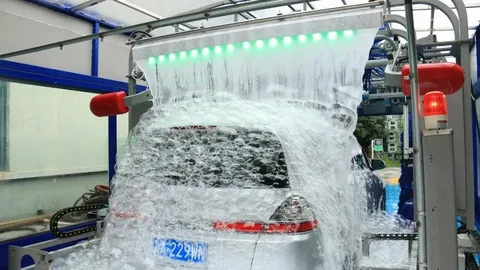From Manual to Smart: The Future of Car Wash Machines in the US

Introduction
The US car wash machine market is experiencing robust growth driven by rising consumer preference for automated vehicle cleaning solutions and the expansion of commercial car wash facilities. As urbanization increases and car ownership grows, demand for fast, efficient, and water-saving washing technologies continues to climb. Technological advancements such as touchless systems, sensor-based cleaning, and eco-friendly water recycling mechanisms are reshaping the industry. With both individual and fleet owners emphasizing hygiene, sustainability, and convenience, the car wash machine market has become an integral segment of the broader automotive services ecosystem.
Market Drivers
Major growth drivers include increasing vehicle sales, growing awareness of vehicle maintenance, and the convenience of automated car wash systems. The trend toward professional and subscription-based car wash services is boosting demand for advanced washing equipment. Water conservation regulations and the need for efficient cleaning systems have led to the development of high-pressure and water-recycling machines. Additionally, the growth of electric and autonomous vehicles is spurring the introduction of specialized, sensor-compatible wash equipment that ensures delicate yet effective cleaning.
Market Challenges
The market faces challenges such as high installation and maintenance costs for advanced washing systems, particularly for small car wash operators. Environmental compliance related to water use and chemical discharge also poses operational constraints. Seasonal fluctuations in car wash frequency can affect profitability, while mechanical breakdowns and the need for regular servicing add to operational expenses. Moreover, consumer hesitation toward fully automated systems due to concerns about vehicle scratches or paint damage continues to be a barrier in certain regions.
Market Opportunities
Technological innovation is unlocking several growth opportunities in the US car wash machine market. Touchless and hybrid washing systems are becoming increasingly popular for their efficiency and safety. Integration of IoT and AI-based monitoring systems allows operators to track machine performance and customer preferences in real time. Waterless car wash technologies and biodegradable cleaning agents are gaining traction in response to sustainability demands. Expanding the self-service and in-bay automatic segments in urban and suburban areas presents further market potential. Franchising and subscription models also offer profitable avenues for investors and operators.
Regional Insights
The southern and western regions of the US, including Texas, California, and Florida, lead in car wash installations due to higher vehicle density, favorable weather, and strong consumer spending. The Midwest, home to large fleets and logistics hubs, shows growing demand for heavy-duty washing systems. The northeastern states, with densely populated urban centers like New York and New Jersey, are witnessing a rise in compact, automated car wash facilities. Rural areas are also slowly adopting mobile and portable washing machines catering to agricultural and small business needs.
Future Outlook
The future of the US car wash machine market is closely tied to sustainability, automation, and digital service integration. Over the next decade, the adoption of energy-efficient, AI-driven, and water-recycling systems is expected to become mainstream. Subscription-based car wash services and app-enabled booking systems will continue to redefine customer convenience. With increasing emphasis on environmental responsibility, manufacturers will focus on developing machines that balance high performance with minimal ecological impact.
Conclusion
The US car wash machine market is transforming from traditional manual setups to fully automated, eco-friendly, and technology-driven systems. As car owners prioritize cleanliness, efficiency, and sustainability, the demand for advanced washing equipment will continue to rise. Innovations in automation, IoT integration, and water conservation are setting new benchmarks for operational excellence and profitability in the industry.
- Art
- Crafts
- Dance
- Wellness
- Movie & Television
- Adult Entertainment
- Fitness
- Food
- Games
- Gardening
- Health
- Home
- Literature
- Music
- Business & Finance
- Religion
- Shopping
- Sports
- Theater
- Drinks
- Other



